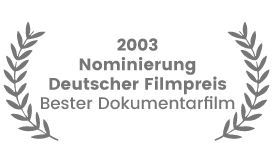
Soldier’s Fortune
Living on the Front Line
DOCU | FILM | CINEMA
Germany 2002
54 Min (Original with english Subtitles)
Directors: Ulrike Franke, Michael Loeken
Soldier’s Fortune is the first documentary to portray the deployment of soldiers abroad from an unusual angle. Kept isolated from the civilian population, the soldiers have settled in their camps and are more concerned about the remaining number of days in action than about political conflicts. The film takes a look at the everyday life of soldiers and discern the delicate difference between expectations and the reality of these missions.
CLIP
AWARDS

FESTIVALS
2003 — Diagonale / Festival des österreichischen Films / Graz, Austria
2003 — Filmwoche NRW, Germany
2003 — Silesia / Schlesische Filmtage / Kattowitz, Poland
2003 — 29. Internationales Filmwochenende Würzburg, Germany
2003 — 24. Filmfestival Max Ophüls Preis, Germany
2002 — DOK Leipzig / 45. Internationales Leipziger Festival für Dokumentar- und Animationsfilm, Germany
REVIEWS
„The documentary offers impressions from a peculiar insular military existence, where the question about the sense and efficiency of this protective mission is never explicitly posed – but the blind spots in what is reported speak for themselves.“
Daniela Pogade // Berliner Zeitung // 11.07.2002
„War is no longer an adventure, full of action. The soldiers are passive, just observing and monitoring. Monotony and boredom are the result. And despite nothing spectacular happening, you’re quickly swept up by this smorgasbord of peculiar incidents. (…) A brief moment of real satire, as sad as it is entertaining.“
Michael Ranze // Hamburger Abendblatt // 22.08.2002
STILLS








SYNOPSIS
December 2001, German Land Forces Headquarter Koblenz: Gunter Gabriel is invited to a reception in his honor to thank him for his efforts in Kosovo and Bosnia. Gabriel considers his tour of the Balkans to be a matter of honor, he refers to the U.S. show stars who have always readily visited their soldiers abroad. A colonel mentions the burden which the soldiers have to bear and stresses that „support of what they’re doing down there“ is the most important aspect of the morale-boosting support teams.
A few months before, a new contingent of soldiers left Germany in a German Air Force plane heading for the Balkans. The plane lands in Prizren, capital of the military sector of Kosovo allocated to the Germans. In the early morning hours, Radio Andernach, „the radio program for the German soldiers of the Kosovo Force“ welcomes the new arrivals, nicknamed ‚Tapsies‘, to the deployment area.
Everyday life begins: roll-call every morning with the Sergeant Major, who distributes mail and informs them about the latest developments in the sector. Afterwards, the soldiers move the tanks to their posts in the streets of Prizren and observe the situation.
After just a few weeks of service, they settle into the routine of „Camp Casablanca.“ Their tasks are clearly defined and the activities become repetitive. This is when the support team under Sergeant Fiedler seeks to motivate the soldiers every day anew. „You’ve got to whip up something spectacular, sure. Like the ‚Grouse Hunt‘ we mounted.“
Apart from Radio Andernach, broadcasts from Italian, Swedish or British radio stations can be received in the area in and around Prizren, which accompany the soldiers on their patrol missions. Glen Mansell of the British Forces Broadcasting Service says that one of the most important tasks of BFBS radio is to remind soldiers that there are people at home listening to the same thing at the same time. „And although that’s not a geographical link, that is a tangible thing.“
In the German field cinema Gunter Gabriel’s concert is about to begin. The soldiers greet their visitor boisterously with the platoon motto: „One for all, all for one!“ To thundering applause Gabriel begins with the first verse of the American rock classic, „House of the Rising Sun“ before he switches to his own, new lyrics: „There is a house in Kosovo, it is bombed and all empty now …“ Gunter Gabriel ends the song with a question, which he answers at the same time: „Who’d want to live in uncertainty about what’s happening at home for 180 bucks a day? – Not me!“
On a square, in front of the ruins of barracks of the former Yugoslav army which were bombed by NATO troops, a military marching band plays and German soldiers line up. A public address system announces that the platoon will receive the Armed Forces Action Medal. The medal in hand, and with congratulations and a slap on the back, the soldiers are sent back to Germany. After the national anthem and a threefold „Hooray“ their foreign mission in Kosovo ends.
CREDITS
Soldier’s Fortune
Living on the front line
Germany 2002
54 Min (Original with english subtitles)
Soldatenglück und Gottes Segen
Über das Leben im Einsatz
Deutschland 2002
92 Min (D)
Directors: Ulrike Franke, Michael Loeken
Director of Photography: Jörg Adams
Ton: Csaba Kulcsar, Maarten van de Voort
Editor: Niko Remus
Commissioning Editor: Werner Dütsch, Sabine Rollberg
Co-Production: WDR/arte
Supported by: MFG Filmförderung Baden-Württemberg, Kulturelle Filmförderung NW, Kuratorium junger deutscher Film, Hessische Filmförderung
